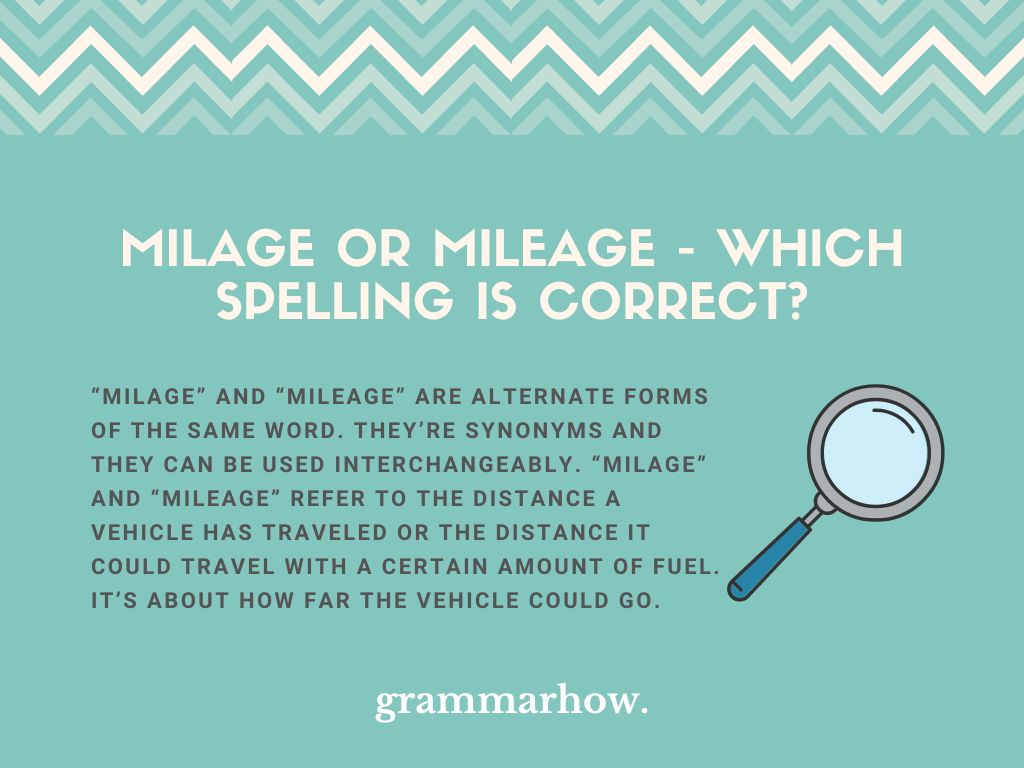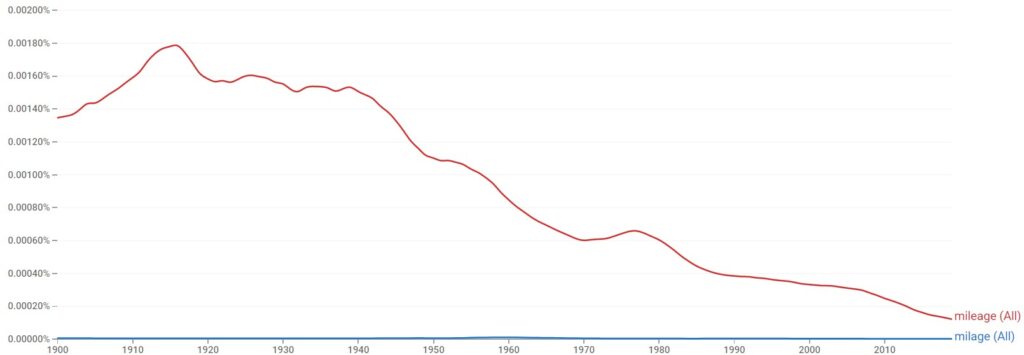When traveling, do you say “Mileage” or “Milage”?
We know that in some places people measure distance using kilometers. But when talking about distance in miles, we want to know what’s the correct form to express ourselves.
Should we say “Mileage”, or “Milage”? Should we avoid any of the forms?
Milage or Mileage – Which Spelling Is Correct?
“Milage” and “Mileage” are alternate forms of the same word. They’re synonyms and they can be used interchangeably. “Milage” and “Mileage” refer to the distance a vehicle has traveled or the distance it could travel with a certain amount of fuel. It’s about how far the vehicle could go.

Take a look at the examples below:
- What’s the milage on the car you have for sale?
- What’s the mileage on the car you have for sale?
The sentences in the example are almost identical. The only difference between them is that one uses the word “Milage”, while the other has “Mileage”. As you can see, both sentences work, because those words are interchangeable synonyms.
“Mileage” is considered the most conventional form of the word. If you prefer to play on the safe side and act conventionally, you should prefer to use “Mileage”. However, you can use the form you feel more comfortable with because both are correct.
Milage
“Milage” is an alternate spelling for the word “Mileage”, which is more conventional. It indicates the distance a vehicle can travel with a certain amount of fuel. Although “Milage” doesn’t seem to be as common as “Mileage” it’s considered correct, and you can use it.
When you look up the word “Milage” in The Cambridge Dictionary it automatically forwards the reader to the definition of “Mileage”, stating amongst the many definitions that it contains, that “Milage” is an alternate for “Mileage”.
Take a look at some helpful examples of sentences that use the word “Milage”:
- Look at the milage on the car you’ll rent before picking it up.
- Make sure you check the milage of the car before purchasing it.
- The milage for our trip tomorrow is about 150 miles.
- If you can drive 400 miles before refueling, that’s good milage.
- The milage of the car is about 50,000 miles.
- In a road trip you should use a car with good milage.
Mileage
“Mileage” is the most conventional form for this word, which has “Milage” as an alternate. It refers to the distance a vehicle has traveled or how long it can go with a certain amount of fuel.
The Cambridge Dictionary adds to that definition, stating that “Mileage” can refer to work as well, as follows: “the amount of money that you are paid or that you must pay for each mile you travel”. In that situation, you can also use “Milage” as an alternate form.
Let’s go over some good examples:
- When we go to Miami next week, you’ll be reimbursed for the mileage traveled.
- I just checked the mileage, it’s higher than I would’ve hoped.
- Smaller cars often have better mileages, and you should consider it.
- Do you get unlimited mileage with the rental car?
- What’s the mileage of the car you have for sale?
- Hybrid cars have better mileage than the ones that run exclusively on gas.
Which Is Used the Most?
Which one of those forms is used more often, “Mileage” or “Milage”? Take a look at the graph from Google Ngram Viewer below.

“Mileage” as the most conventional form of this word is the one that appears more frequently. This is what we expected to see because most people don’t even seem to know that “Milage” would be an acceptable form to use.
There’s no question that “Mileage” is the prevalent form in this comparison. “Milage” appears at the very bottom of the graph, rarely used by people.
Keep in mind that you can use both forms and be fine. However, if you feel more comfortable using the more conventional forms, you should prefer to use “Mileage”.
Final Thoughts
“Milage” and “Mileage” are synonyms and can interchange. They are alternate forms of the same word, and refer to the distance a vehicle has traveled or the distance it could travel with a certain amount of fuel. “Mileage” and “Milage” measure the distance a vehicle goes (or will go).

Martin holds a Master’s degree in Finance and International Business. He has six years of experience in professional communication with clients, executives, and colleagues. Furthermore, he has teaching experience from Aarhus University. Martin has been featured as an expert in communication and teaching on Forbes and Shopify. Read more about Martin here.

